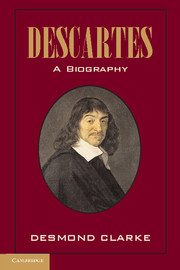Book contents
- Frontmatter
- Contents
- Preface and Acknowledgments
- Note on Texts and References
- Descartes Family Tree
- Introduction
- 1 A Lawyer's Education
- 2 In Search of a Career (1616–1622)
- 3 Magic, Mathematics, and Mechanics: Paris, 1622–1628
- 4 A Fabulous World (1629–1633)
- 5 The Scientific Essays and the Discourse on Method (1633–1637)
- 6 Retreat and Defence (1637–1639)
- 7 Metaphysics in a Hornet's Nest (1639–1642)
- 8 The French Liar's Monkey and the Utrecht Crisis
- 9 Descartes and Princess Elizabeth
- 10 The Principles of Philosophy (1644)
- 11 The Quarrel and Final Rift with Regius
- 12 Once More into Battle: The Leiden Theologians (1647)
- 13 Thoughts of Retirement
- 14 Death in Sweden
- Appendix 1 Descartes' Principal Works
- Appendix 2 Places Where Descartes Lived
- Notes
- Bibliography
- Index
5 - The Scientific Essays and the Discourse on Method (1633–1637)
Published online by Cambridge University Press: 18 July 2009
- Frontmatter
- Contents
- Preface and Acknowledgments
- Note on Texts and References
- Descartes Family Tree
- Introduction
- 1 A Lawyer's Education
- 2 In Search of a Career (1616–1622)
- 3 Magic, Mathematics, and Mechanics: Paris, 1622–1628
- 4 A Fabulous World (1629–1633)
- 5 The Scientific Essays and the Discourse on Method (1633–1637)
- 6 Retreat and Defence (1637–1639)
- 7 Metaphysics in a Hornet's Nest (1639–1642)
- 8 The French Liar's Monkey and the Utrecht Crisis
- 9 Descartes and Princess Elizabeth
- 10 The Principles of Philosophy (1644)
- 11 The Quarrel and Final Rift with Regius
- 12 Once More into Battle: The Leiden Theologians (1647)
- 13 Thoughts of Retirement
- 14 Death in Sweden
- Appendix 1 Descartes' Principal Works
- Appendix 2 Places Where Descartes Lived
- Notes
- Bibliography
- Index
Summary
I also noticed, about experiences, that the more we advance in knowledge the more necessary they become.
(Discourse on Method: vi. 63)During the years immediately following the condemnation of Galileo, Descartes held fast to his initial view that the cardinals had made a mistake, though one that was potentially dangerous for himself. His fundamental idea was that the decision involved a misunderstanding of the role of the Bible as a source of scientific knowledge. He also argued that he was not bound to accept the Roman decision as a matter of faith, and he hoped that it would be reversed in due course so that he could publish his World without fear of censure. He had to concede, however, that as long as there was no change of mind about Galileo by the church, the World would remain ‘out of season’ (i. 324). Descartes' refusal to publish The World was therefore not as definitive as it seemed to people like Mersenne, to whom he wrote: ‘If the reasons that prevent me from publishing it were to change, I could make a different decision without thereby being fickle’ (i. 367). We know now, in retrospect, that there was no change in Rome's censure, and that there was none either in Descartes' decision. His first book remained unpublished throughout his lifetime.
In these circumstances, the next-best option was to consider ways in which parts of his work that were not theologically sensitive could be released to the public.
- Type
- Chapter
- Information
- Descartes: A Biography , pp. 126 - 155Publisher: Cambridge University PressPrint publication year: 2006



